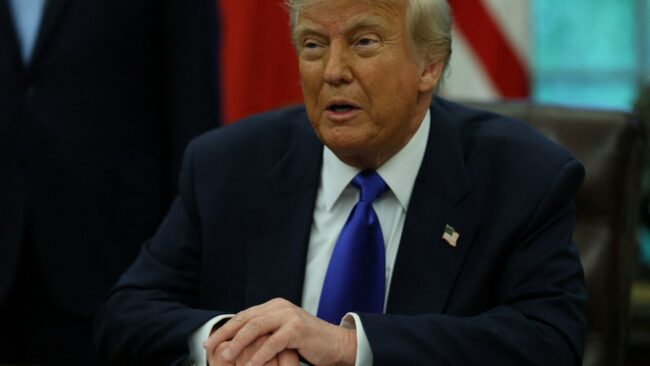U.S. President Donald Trump speaks before signing executive orders in the Oval Office at the White House, in Washington, D.C., U.S., May 5, 2025.
Leah Millis | Reuters
President Donald Trump on Monday signed an executive order to incentivize prescription drug manufacturing in the U.S., streamlining the path for pharmaceutical companies to build new production sites stateside as potential tariffs on imported medicines loom.
The order directs the Food and Drug Administration to reduce the amount of time it takes to approve manufacturing plants in the U.S. by eliminating unnecessary requirements, streamlining reviews and working with domestic drugmakers to “provide early support before facilities come online,” according to a White House fact sheet.
It also directs the agency to raise inspection fees for foreign manufacturing plants, improve the enforcement of active-ingredient source reporting by overseas producers and consider publicly listing facilities that don’t comply.
The White House estimates that it can currently take five to 10 years to build new manufacturing capacity for pharmaceuticals, which it called “unacceptable from a national-security standpoint.”
“We don’t want to be buying our pharmaceuticals from other countries because if we’re in a war, we’re in a problem, we want to be able to make our own,” Trump said in the fact sheet. “As we invest in the future, we will permanently bring our medical supply chains back home. We will produce our medical supplies, pharmaceuticals, and treatments right here in the United States.”
The order will allow the FDA to conduct more inspections of new manufacturing sites with the same resources, the agency’s commissioner, Marty Makary, told reporters on Monday. The FDA will also ramp up inspections of foreign drug facilities, switching from announced to “surprise” visits overseas, he said.
“We had this crazy system in the United States where American pharma manufacturers … are put through the ringer with inspections, and the foreign sites get a lot easier with scheduled visits, while we have surprise visits,” Makary said.
Trump’s order also directs the Environmental Protection Agency to “accelerate the construction of facilities” related to manufacturing drugs and their ingredients. And, it ensures that federal agencies issuing permits for a domestic pharmaceutical manufacturing facility designate a single point-of-contact to coordinate applications, along with support from the White House Office of Management and Budget.
The order comes ahead of Trump’s planned tariffs on pharmaceuticals imported into the U.S. Those potential levies – and efforts to build goodwill with the President – have already fueled a fresh wave of domestic manufacturing investments from drugmakers such as Eli Lilly, Johnson & Johnson and AbbVie.
Trump on Monday told reporters he will announce pharmaceutical-specific tariffs within the next two weeks. His administration disclosed in April that it had opened a so-called Section 232 investigation into how importing certain pharmaceuticals affects national security — a move widely seen as a prelude to initiating tariffs on drugs.
Some pharmaceutical companies are starting to push back on Trump’s plans. For example, Pfizer CEO Albert Bourla said last week that the tariff threat is deterring the company from making further U.S. investments in research and development and manufacturing.
U.S. manufacturing in the pharmaceutical industry has shrunk significantly in recent decades. Production of most of the so-called active ingredients in medicines has moved to China and other countries, largely due to lower costs for labor and other parts of the process, according to the Food and Drug Administration.
The U.S. imported $203 billion in pharmaceutical products in 2023 alone, with 73% coming from Europe, primarily Ireland, Germany and Switzerland, according to analysis conducted by consulting firm EY.
Reshoring manufacturing can help make the drug supply chain more robust, decreasing the risk of disruptions, according to an April release from GlobalData, a data and analytics company. Still, it could elevate production costs and drug prices, raising affordability concerns, GlobalData said.
www.cnbc.com
